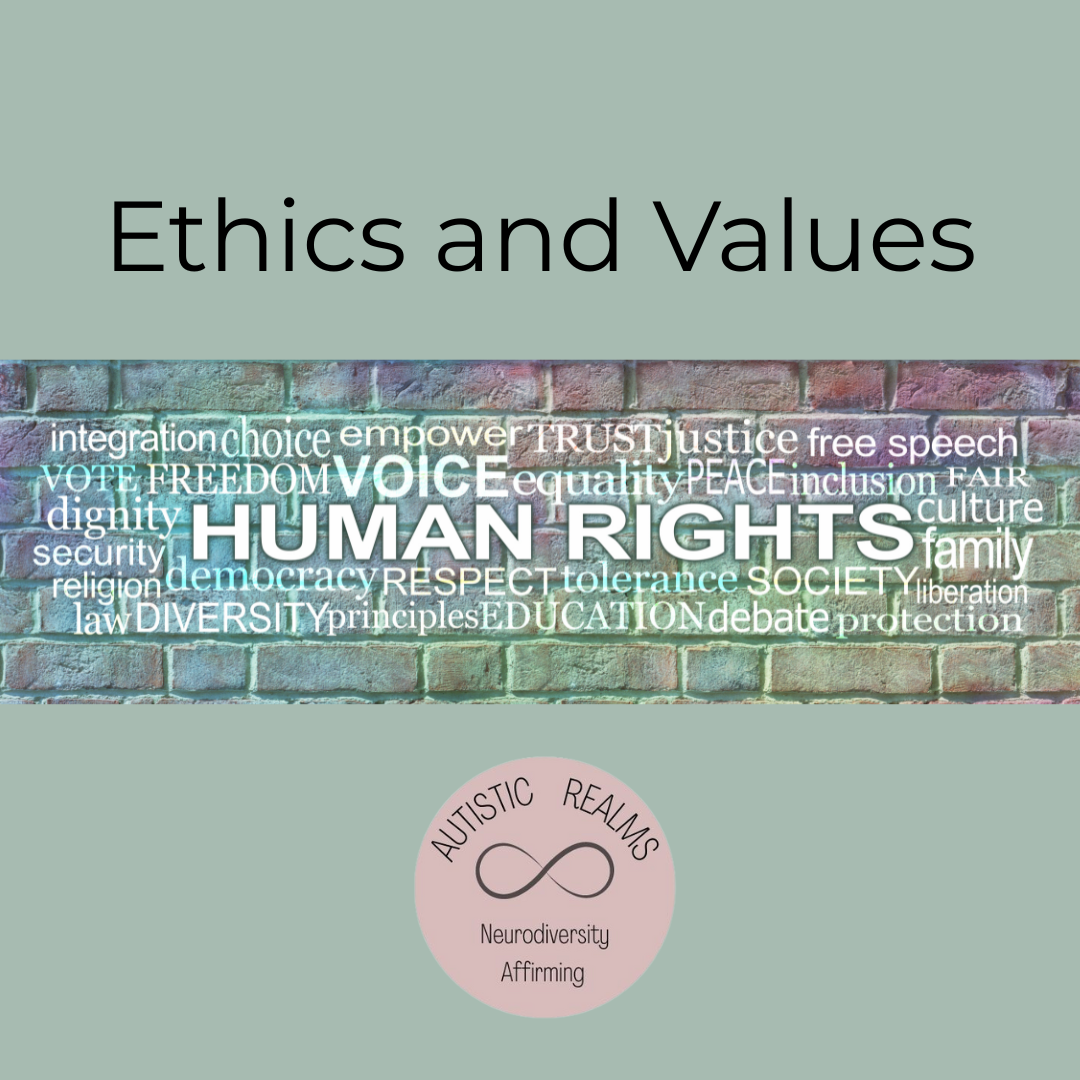Autistic Realms is grounded in values of authenticity, autonomy, and relational care for the human rights of Autistic or otherwise neurodivergent and disabled people. These guiding principles align closely with the ethics and principles of both the Therapist Neurodiversity Collective (TNDC) and the Autistic Self Advocacy Network (which I am a member of – ASAN), whose work has shaped much of the global neurodiversity-affirming and disability-rights movements, alongside Thriving Autistic (who I work with as their Communications and Community Lead) and Stimpunks (who I volunteer with as their Co-Creative Director).
The following points reflect shared commitments to human rights, justice, dignity, and respect for all neurodivergent ways of being, alongside the central belief that Autistic people must be included in every decision that affects Autistic lives.
These values centre safety, consent, and belonging, affirming that every person has the right to exist, communicate, and thrive without coercion, normalisation, or conformity. They embody a vision of communities built on respect, interdependence, and the freedom to be fully oneself.
(Adapted and inspired by Therapist Neurodiversity Collective’s Ethics & Values and ASAN’s What We Believe)
Autistic Realms Ethics and Values
- Autistic and neurodivergent people are not problems to solve or bodies to cure— our voices and identities deserve respect, not correction or suppression.
- Disability rights are recognised as civil human rights — access, inclusion, and equity are essential.
- Equitable inclusion depends on unrestricted access to supports, accommodations, and modifications across all environments.
- Support approaches must honour neurodivergent ways of being — including identity-first language, sensory processing and communication differences — centring the person rather than the diagnosis.
- Respect for personal agency must guide every interaction.
- Strengths-based and interest-led approaches are essential, and I strongly oppose behaviourist, deficit-based or pathologising models.
- Compliance-based behavioural methods such as Applied Behavior Analysis (ABA), Positive Behaviour Support (PBS), and Positive Behavioural Interventions & Supports (PBIS) are incompatible with neurodiversity-affirming practice alongside Social Skills training that teaches neuronormative expectations. (I have collaborated, endorsed and signed campaigns with the NeuroDiverse Connection and Stimpunks who are also against compliance-based behavioural methods).
- Humane, trauma-informed approaches are essential, where respect for bodily autonomy and sensory regulation is paramount.
- Seclusion and restraint are considered harmful and have no place in ethical or affirming care.
- Communication is a human right. Access to Augmentative and Alternative Communication (AAC) is a human right; communication should never be gatekept.
- Functioning labels are harmful; support should be specific and needs-based.
- Identity-First Language is used whilst respecting individual preferences.
- Social Skills and Social Use of Language Programmes that promote masking or demand neuro-conformity are not supported; authentic connection, co-regulation, inter-dependence and mutual understanding are prioritised.
- Bodily, psychological and sensory autonomy and consent must always be respected.
- Every person served deserves dignity, humanity, and respect in all interactions and decisions.
- Autistic people must be involved in all decisions about autism, supports, research, and policy — “nothing about us without us”.
- Autistic lives are worth living: research, support and therapies should focus on support and inclusion, not cure, removal, or normalisation of Autistic identity.
- Every Autistic person belongs in the Autistic community — regardless of diagnosis, self-identification, support needs, speaking status, or other disabilities or intersectionality.
- People can only thrive in environments free from hatred, intimidation, prejudice and control — communities must be built on care, equity, and freedom.
Inclusion Must Be Global, Decolonized, Culturally and Linguistically Diverse, and Anti-Normative
Srinivasan, H., Chan, T., Kim, S. Y., Obeid, R., Jones, D. R., Botha, M., Giwa Onaiwu, M., Tan, D. W., Waisman, T. C., Kapp, S. K., Kassous, I., Mathaga, J., & Gillespie-Lynch, K. (2025). Inclusion must be global, decolonized, culturally and linguistically diverse, and anti-normative. Journal of Social Issues, Advance online publication.
Inclusion Policy Guidelines from Srinivasan et al. which I support:
1. Universal access to AAC (Augmentative and Alternative Communication)2. Recognize diversity when developing supports
3. Create individualized and adaptable supports
4. Support body systems together, including sensory, emotional, and motor regulation
5. Take a decolonial approach
6. Build intersectional advocacy
7. Increase tech equity
8. Create opportunities for nonspeaking people and people from Global South to design research
9. Promote neurodivergent citizen power
10. Address information accessibility gaps through multimodal resources
11. Develop valid assessments to select and/or improve AAC
12. Report Conflicts of Interest (COIs) and funding decisions
These principles guide all my work within Autistic Realms; from creative projects and training to community collaboration. They reflect a commitment to building spaces of co-regulation, inter-dependence, acceptance, access, and shared humanity and not replicating broken systems and harmful ways of surviving. At their core lies a belief in the right of all Autistic, neurodivergent and disabled people to live, communicate, and connect authentically — free from coercion and grounded in respect, equity, and belonging.
Positionality & Privilege
This work is written from a specific lived position: as a white, Autistic woman based in the UK, with educational privilege and the safety to openly identify as neurodivergent. These factors shape the perspectives shared here and the access available to me within systems that remain unequal. My commitment includes ongoing reflection, accountability, and the amplification of voices from other and multiply marginalised Autistic and neurodivergent people and communities — locally and globally — particularly those whose experiences exist at the intersections of racism, disability, gender diversity, classism, trauma, and other forms of structural oppression. Intersectionality is essential to this work; liberation for Autistic people must include and centre those most impacted by injustice.














